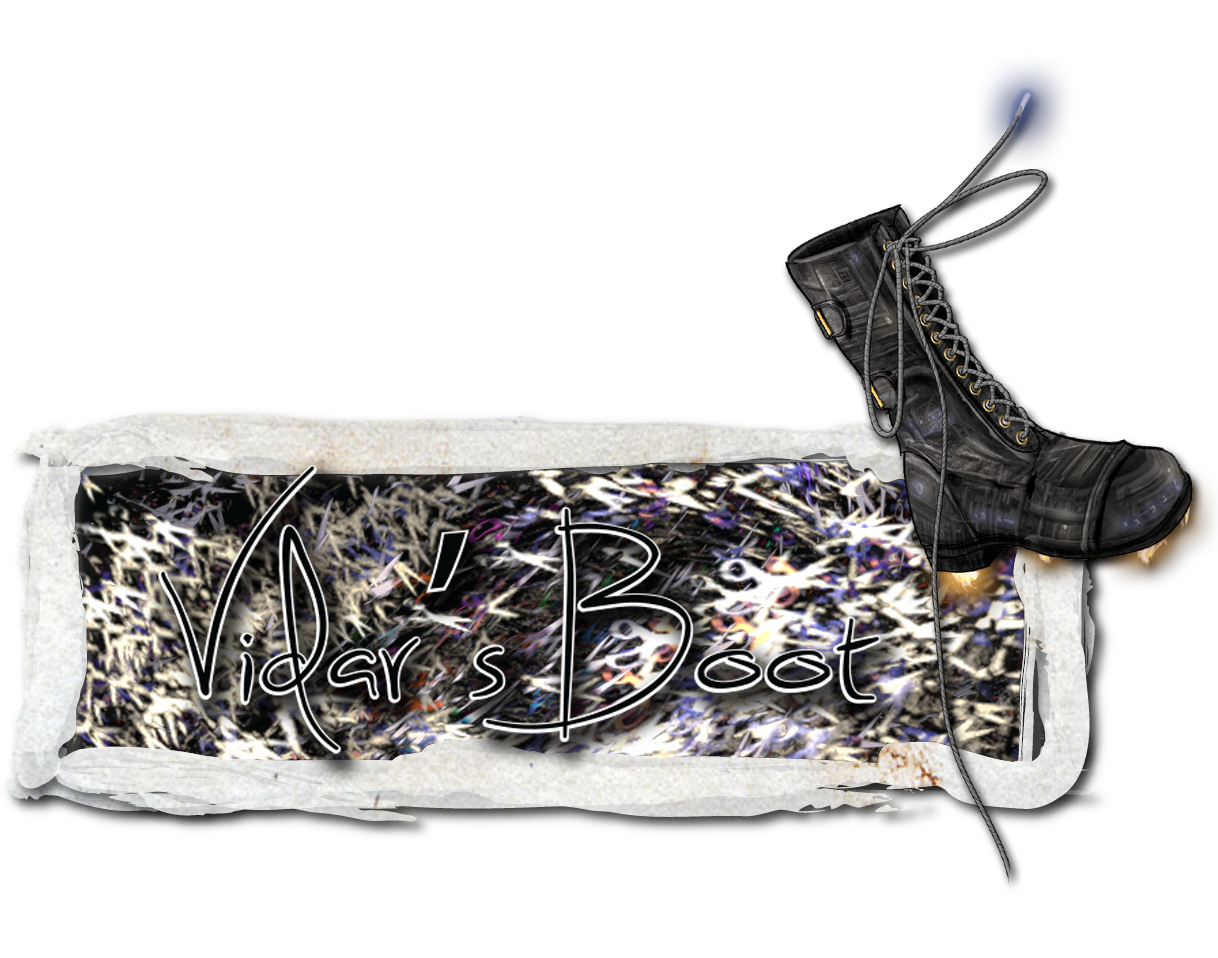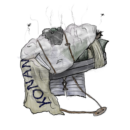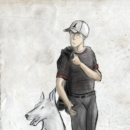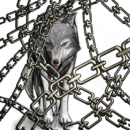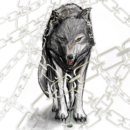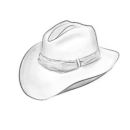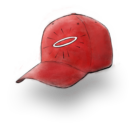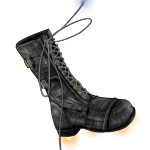– 6 –
Skip ahead a bit.
Edmund wakes up. Edmund yawns. Edmund stretches. Edmund wanders off to eat Sid, because he’s hungry.
The little wimp from the House of Torment, Edmund discovers, has got a gun.
It’s pretty amusing. Edmund stares at Sid’s face. He looks down at the gun’s barrel. He looks back up. He doesn’t laugh, because his heart is in a stone box in his pocket, but he can’t help giving the other boy a little smile.
He’s Edmund, of the House of Hunger. He isn’t frightened of a gun.
“It’s a death ray,” says Sid.
Edmund steps casually forward.
“Tom made it,” Sid explains.
Edmund stops. He hesitates. He squints.
“I’ve eaten death rays,” he says.
“Tom made it,” Sid says again.
Edmund sighs. He leans against the doorframe of Sid’s room. He stretches up his arm. “You can’t possibly —”
He stops. He shudders all over. There is a spider crawling on his arm. Apparently it was living on the top of Sid’s doorframe. He tries not to freak out and wave his arm around. His heart is in a box of stone. He has eaten people. He is bound to a giant wolf.
Just barely, he manages not to freak.
He lowers his arm. He shakes the spider gently off onto the floor. He lifts his arm back up again, but not all the way.
“Mathilda,” says Sid sternly to the spider. He leans forward. He picks up the spider with his free hand. He shudders all over, twice. He closes his eyes. There’s a perfect moment there for Edmund to attack him, but when the moment ends, Edmund hasn’t, yet.
“I hate spiders so much,” confesses Sid.
There are little red marks all along his arm where he’s been pulling out his hairs. It’s like the spider is crawling up a stucco road.
“You can’t possibly want to stay like this,” says Edmund.
“No,” says Sid. “But I’ve got to, don’t I?”
“No,” says Edmund.
“It’s necessary that there be a sacrifice,” Sid says. “The hat said.”
“For what?”
Sid waves his gun around. “For the world.”
Edmund’s eyes narrow.
“See,” says Sid, “there’s a — there’s a weight, you know? Ever since God, or whomever, died. There’s all this chaos and strangeness pressing in on things. There’s all this madness. And if it doesn’t have a place to drain into, if it doesn’t have someone to hurt, then it pops through and breaks everything and it frees the wolf . . .”
He doesn’t make it through the last word. Right or wrong, he doesn’t make it.
That’s just the way the cookies crumble.
Edmund is moving. The death ray is firing. Edmund knocks the beam aside one-handed and he leaps on Sid.
This doesn’t actually work, by the way. This is actually called “being hit by a death ray, one-handed.”
Only: Death is small.
Death is small, and the wolf is large; and Death may not have Fenris’ Edmund Gulley.
– 7 –
Still later yet:
The scissors fall. For a second time in Earth’s history — not counting the little spurts and dribbles that had come between — scissors fall out of space.
How many?
I cannot count them all. Too many. They are endless.
Most of them were flattened under Vidar’s Boot when it came down, or have been battered away by the wave of reality-alteration that spreads from it, but uncountable scissors remain. They pour themselves down from the endless sky in a single metal sheet: indivisible, like the horn of a narwhal spiraling down, ten miles around at its narrow tip.
And there is half a wolf.
That is a terrible thing. Half a wolf, its guts spilling out behind it, but the boot has missed it. The boot has almost missed it. The boot has . . . partly missed it, as it came down from space.
It is half a wolf, and therefore it is better than none.
It is half a wolf, whining and struggling, sickening, its eyes rolling, its tongue lolling, but it is not dead; and that wolf, that particular wolf, well, if it is not dead, then it should not be possible for it to die.
And there is a snake, and oh, how ungodly is that snake. It is rising, and it is rising, and it is pierced through over and over again by the scissors but the will of Vidar’s Boot commands that it does not die.
Its teeth close on the side of the wolf. The wolf snaps at the scissors, gulps them down. And the boot is shattering, fraying, leaving only Cheryl, standing there, with the hammer of science —
I probably shouldn’t call it that.
With the hammer of deciding what shall live and what shall die held and coiling with lightning in her hand.
In this the end of days they raven, and they curl in on one another, and I think this is an egg:
A thing from which something beautiful should be born; will be born; would have been born, except —
– 9 –
“I’ve been a lot of things. You know?” the antichrist says to Edmund.
They were raised together: them, Jane, and Tom.
“I’ve been a lot of things, but I’m really only one thing now.”
Says the antichrist: “I’m just your friend.”
– 1 –
At the edge of the Lethal Magnet School for Wayward Youth, where once the great engineering building rose, Mr. Gulley commissions a very large boot.
There is a world-devouring wolf in his basement, but he is not defeated.
His own son has attacked him; bit through his shoulder —
But he is not dead.
“I will make a boot,” whispers Mr. Gulley, as if in fever; and this thing he does.
– 2 –
Principal Goethe pleads on the TVR for assistance. He warns of the impending freedom of the wolf.
For political reasons, relating to funding and potential liability, he does not explain that the wolf is currently in the basement of the owner of his school.
He simply begs.
He isn’t dead yet. He isn’t half-eaten yet. That happens later.
He’s still alive when this happens.
And shoe leather begins to flow in from all around the world.
“Bombs would not stop the wolf,” explains Mr. Gulley, in an international broadcast. “We will gladly take bombs. We will gladly integrate them into the fabric of our grand design. But this is only because I personally rather like bombs.”
He does not explain his awful wound. He lets the press imagine. They come up with many theories. “Attacked by a savage ex-President who wants the wolf’s power for America” is probably the best.
“I have dim and distant hopes for bombs,” he says, “And the scientists of my Lethal Magnet School, well, they enjoy them, but bombs will not stop the wolf.”
A crack team of astronauts would not be able to stop the wolf.
Principal Goethe explains this with a flip chart on his amazing televisual radio broadcast.
He illustrates how a crack team of astronauts might fly to the wolf, carrying a nuclear payload. He shows how they would use digger robots to make a shaft deep into the fur of the wolf. They would drop the nuclear arsenal under the wolf’s skin and fly away.
But this would not stop the wolf.
“What of Bibury?” asks a nosy reporter, but Goethe just shakes his head.
“Skoll was young,” says Goethe. “Skoll was new.”
“But the bombing of Bibury still killed hi—”
“Skoll,” says Principal Goethe, “was just a puppy. Fenris is cunning, sharp, and ruthless. Fenris is older than the hills.”
MacDuff the Crime Hound — actually, MacDuff III, the original Crime Hound having died in the incident with the fire bees, and his daughter having retired after facing a relentless slew of sexist criticism over the course of her career — teaches children wolf safety.
“If a wolf comes to eat you,” he says. “Tell the wolf NO!”
MacDuff the Crime Hound, III, isn’t really expecting that this will stop the wolf. Not even a small one!
He’s just trying to give the children a sense of power over their own lives.
Against the wolf the prayers of the world are futile. No one hears them, except maybe St. Saul, St. Peter, and St. Bethany, and they have no real idea, even if they can hear them, what they could possibly do.
Threats are useless too.
The post office occasionally tries to deliver hate letters, threat letters, and anthrax to the wolf, but here the post office is helpless. They deliver some to the north pole, but this is an error. They visit to the places below Lemuria, where the post office ought not go; this proves equally incorrect. They do not know where the wolf lives so they cannot deliver.
They only know that one day the wolf will come.
A special subsidiary of the Lethal corporation finally perfects a wolf-killing virus made out of the ashes of dead camels and the phoenix. It is administered by remote injection while Mr. Gulley stands back, face drawn tight with a mix of emotions. In the end it only makes Fenris hiccup, smolder, and sulk.
So people rely on their shoes.
“I’ll depend on our shoes,” says Mr. Brown, of Sussex.
“That’s right!” says his daughter Susan.
She takes off her shoes. She brandishes them at the sky in defiant fury. “SHOE!” she yells. “SHOE!”
She is very young.
It is a young person’s yell, in the face of a world of wolves.
And bit by bit people send their shoe leather in to help with the construction of the boot. All across Europe; even Asia, Africa, the Middle East — they send their shoes to the plucky children of the Lethal Magnet School for Wayward Youth.
Only in America — where the signs of trouble and apocalypse have been oddly few and patriotic reverence for hypothetical ravenous ex-Presidents runs high — is the project seen as a special interest and greeted with disdain.
He builds a giant boot, does Mr. Gulley, on the Lethal campus he has made; but he faces the same problem that Hans had lain out for Joffun, so many years ago:
But who could stomp such a boot?
The shoes pour in.
– 3 –
Edmund wakes in his hospital bed. He clutches at the sheets and blankets. He pulls them over him.
He remembers.
He’d tried to kill his father, he thinks. Had been killing him. He had been eating him. He’d gotten so very close to it and it wasn’t his conscience that had stopped him cold.
Fenris had howled, and the wind had blown, and the walls around Edmund’s heart had broken down —
The world had poured into him. In, and in, and in; it was an overpowering chaos, formless, incomprehensible, too strong, too real, and too wild for him to shape it into sense.
It must have been hours ago. Days.
He remembers lights, and sounds. They were not parseable. He remembers trying to hide from the awful, mind-breaking sound of his own screams.
His arms and legs are pasty, thin, and weak. They are covered in goosebumps. This puzzles him.
It had been summer, hadn’t it?
Hadn’t it been warm?
He sits up.
He wobbles.
He has a distant, swimming memory of his father’s face.
He frowns.
There is a stone box on a table beside him; that, and flowers, and a card. He picks up the box. It looks like his old wooden heart-box, but he can’t feel his heart inside it. He rattles it; his vision whitens, and he can almost then feel the dizzying stutter of a pulse.
He nods. It is his heart.
He can hardly feel anything at all. He is numb and dispassionate all through him, he with his heart in a box of stone. Even the hunger for human flesh inside him is distant, now, and weak.
He reads the card. He puts it aside. He sighs.
“Some son you are,” he mutters to himself.
It is really embarrassing. He remembers assuring his father that he was not a wayward child. But who has had the last laugh now?
. . . possibly it was still Edmund.
His father’s shoulder had been extremely good eating. He flutters his eyes closed for a moment, overcome by joyful memory, and then he pushes the gift and treasure of that memory down into his heart’s stone box.
He unplugs his IV and walks over to the door. There are a selection of white hats and coats hanging there. He takes his favorite hat, puts it on, adjusts it. He stares at the coats for a while.
“I wonder if it’s cold,” he says.
He stares at his skin.
“I am fairly sure that I am really, really cold,” he says.
He puts on a coat. He puts his heart in his pocket.
“I wonder if you can set people free,” Edmund says, “without killing and eating them.”
He is a god of freedom. He is also a cannibal. These things happen.
He scratches at his hair.
He wanders out.
– 4 –
He eats hardly anybody in the hospital. Not the doctors. Not the nurses. He needs food. He needs strength. But he’s not a monst —
Well, he is a monster.
But he sticks to raiding the morgue and the brain-dead, and one man —
He has no justification for believing this.
It is an excuse. He should admit to this; only, if he admits to this, he might lose control and eat everybody. But —
One man that he thinks that it seems like nobody will actually miss.
– 5 –
Edmund slips back to campus. He finds a new room. He sleeps inside it. He wakes and finds they’ve locked it and bound it up with chains.
“You don’t have to die just because some people think your existence is evil.”
— motto of the “Doom Team”
(Tom, Linus, Edmund, and Jane)
– 1 –
In the headquarters of Konami a young executive named Mr. Koga stands. He has been inspired. He has dreamed, as Mr. Matsuda dreamed.
“I have seen it,” he says.
He looks far away.
“In my dreams they crash down before me,” he says. “The lightning and the red. And fire lashes up from the sewers to take me, and it eats me, down to my bones; and God is with me, then, he is telling me, thus ends all mortal hope.
“I am dead,” he says. “I am the walking dead. For I have died in dreams. But from the land of death I bring a jewel. I have seen it. I have seen how to fix the greatest flaw in the Konami Thunder Dance. It is the truth that is given to me by God.”
He is fired for his presumption. Then later the company sends a thunder dancer and two programmers to talk to him. They speak to him late into the night.
They return with a jewel of knowledge, clutched to them like a sacred hat.
“We can do it,” they report, to the board of directors. “We can patch the hole. We can close out Dynamite.”
